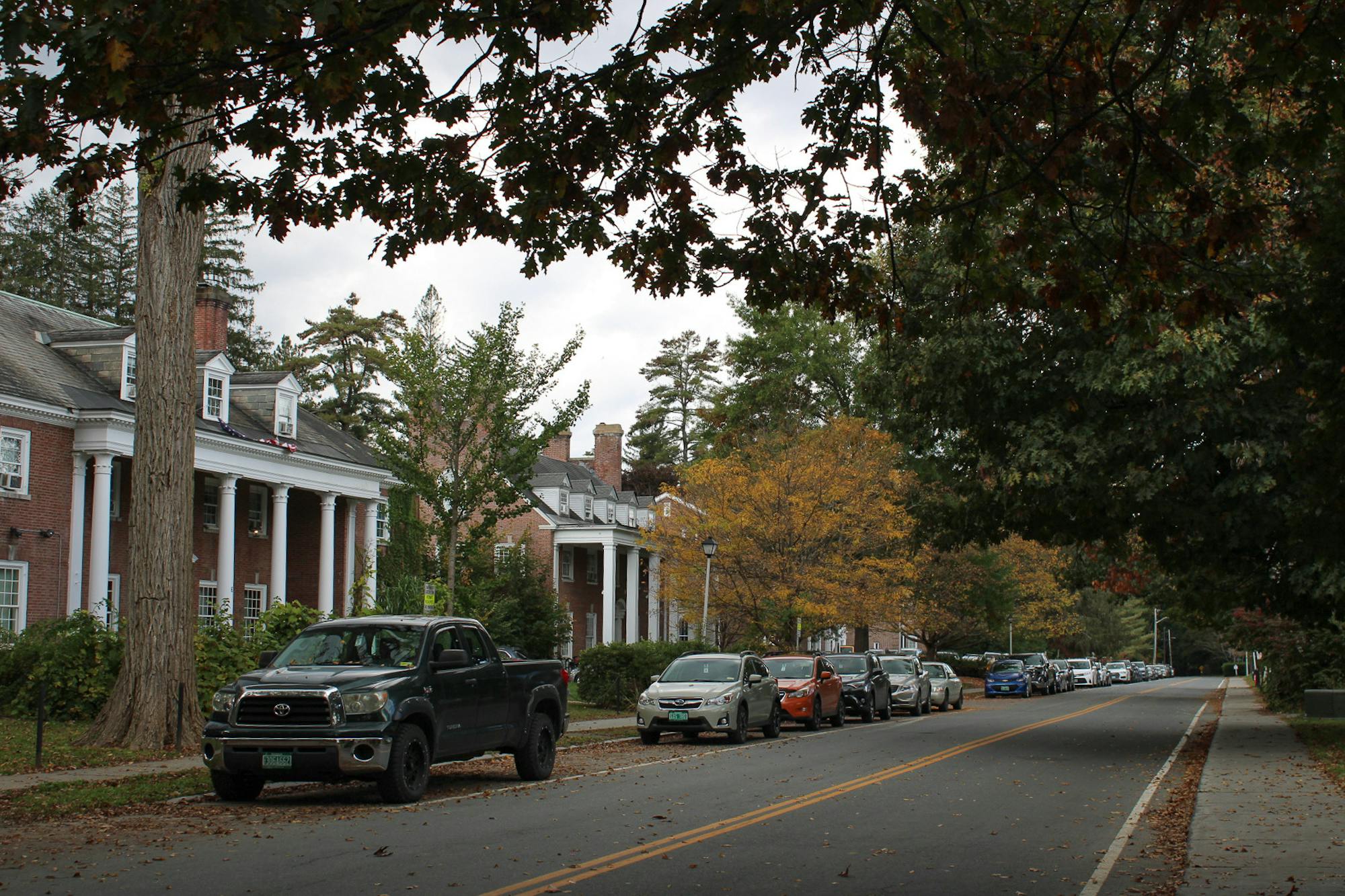This article is featured in the 2023 Homecoming special issue.
After watching the Dartmouth experience captured in the film “Animal House,” an outsider or prospective student might find it hard to imagine that campus isn’t overrun by frat debauchery, nights of partying and loveable troublemakers similar to characters “Bluto” and “Otter.” For the current first-years, the frat ban lasts until 12 p.m. on Nov. 1, so partying all night at frats has not been part of their onboarding.
Aside from performance group shows hosted in Greek spaces and dry events open to ’27s, first-years are not allowed to enter Greek spaces for about the first six weeks of fall under the First-Year Risk Reduction Policy.
The Dartmouth sat down with various members of the Class of 2026, the most recent class to experience the frat ban, to gather some advice on navigating the first-year social scene.
Eliana Stanford ’26 discussed how important some of the spontaneous connections made during a student’s first year, either in freshmen parties or frats, can be later in one’s Dartmouth career.
“It’s all going to be awesome and okay,” she said. “Your social circle will be your favorite thing about Dartmouth come sophomore fall. Trust the process.”
Other ’26s took a more critical look at the exaggerated importance some first-years currently seem to attach — or seemed to attach last year — to parties in Greek houses.
“Honestly, it’s midterm season … why do [the ’27s] need to be raging?” Maddy Slater ’26 said with a laugh. As she slogged through her own assignment for COSC 30, “Discrete Mathematics in Computer Science,” it seemed clear that weeks four, five and six here at Dartmouth have their own share of stress and sleep deprivation, long nights spent partying aside.
The answer to end-of-frat-ban malaise may be as simple as thinking a little outside the box that is Hanover.
“What got me out of my [academic preoccupation] was movie nights with my friends or going and doing little activities to switch it up — whether it’s renting a Zipcar and going to Target, or as ambitious as taking the [Dartmouth] Coach to Boston. Whatever gives you a sense of normalcy,” Stanford said.
The transition to Dartmouth — entirely new groups of friends and classmates, different food, different routines — can be a lot for first-years. Even by the time the frat ban ends and the ’27s feel more settled, that “sense of normalcy” can still be hard to come by.
Annika Sharma ’26 thought back nostalgically on those final weeks before the end of the frat ban when the focus of social life still seemed entirely about getting to truly know first years.
“Enjoy these last few weekends before going out [to frats] to really spend quality time with your friends,” she said. “It’s a sacred time, and you’ll look back on it fondly.”
Felix Feldman ’26 also expressed gratitude for the time the frat ban provided to get to know his class.
“[I am] very happy that the freshman class had time to get to know each other and exist within our own social world before integrating into the greater Dartmouth social bubble.”
Contrasted against the pre-frat ban weeks, the subsequent time can mark a shift of social groups. Amidst the increasingly Greek-focused time to conclude the fall term, some first-years begin to place heightened value on social perceptions, knowledge and connections, according to Reed Levinson ’26.
“The frat ban being lifted is definitely a time of flux during your freshman year, so try your best during that time not to posture socially and pretend that you know all the scenes or anything like that,” Levinson said. “No one truly knows what they’re doing yet. If you’re more in-the-know than a friend, be a good guy, extend an invite, go out and have fun together. Just because the designated time with ’27s [is ending] doesn’t mean you shouldn’t or can’t have a blast with your friends.”
Feldman opened up about his uncertainty while entering into the second half of his first-year fall term.
“In the weeks before frat ban ended, I wasn’t exactly sure what to think,” he said. “I think my images of Greek life were false and shaped more by films than reality. So I was nervous, looking forward to getting it done, looking forward to feeling like ‘an adult’ on campus.”
Still, other ’26s thought more about the additional spaces they’ve enjoyed during their past year here. For Trixie Joy Adlaon ’26, the opening of Greek spaces to first-years didn’t feel all that life-changing.
“It’s frats — all you’re doing is partying,” she said. “It’s not that much different from going to the Fays, besides there being people other than your own class there.”
According to Adlaon, many of the most rewarding experiences at Dartmouth are not, in fact, found in a fraternity basement. She spoke to her own initiative to find organizations and spaces she genuinely enjoys.
“Join organizations. I prefer [organizations] that don’t require tons of time commitment,” Adlaon said. “I sign up for random DOC trips on Trailhead, go to POCO [People of Color Outdoors] stuff, book club, sometimes the knitting and crocheting club.”
This perspective on campus life can be important to remember for first-years who may feel there is nothing else to do in Hanover, barring partying and studying, according to Adlaon.
As Greek leaders prepare to welcome the newest class into Greek houses on Nov. 1, the Class of 2026 urged ’27s to try their best to enjoy the time until then.
“Just keep pushing through with dorm parties,” Sharma said. “It’s a formative experience. It wouldn’t be Dartmouth without those [freshmen spaces], so see yourselves as just one class in a long legacy of this special experience.”
And remember, regardless of how good the scenes are in these final days of frat ban, your time in frats will come, ’27s. Go forth and party (responsibly).
Stanford currently works for The D-Brief Podcast.




